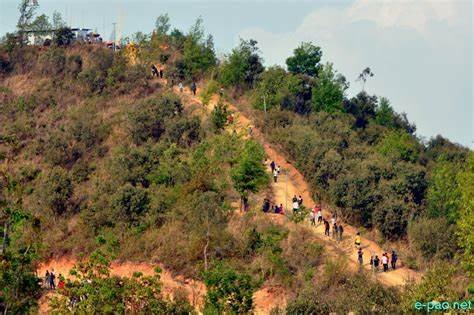Kuki-Zo civil society organizations have warned the Meitei community against crossing the buffer zone at Chinga Kaba in Thangting Hills this April, calling it a direct challenge. The joint statement demands government action to maintain peace amid Manipur’s fragile ethnic divide.
BY PC Bureau
Tensions in Manipur’s conflict-ridden landscape have escalated with a stern warning from Kuki-Zo civil society organizations, who claim the Meitei community plans to cross the buffer zone at Chinga Kaba in Thangting Hills this month. In a joint press statement issued on Wednesday, April 9, the groups declared that any such attempt would be viewed as a “direct challenge” to the Kuki-Zo community, holding those who cross responsible for any resulting incidents.
The statement also urged the government to take measures to ensure the safety of both communities and called for maintaining the status quo in the buffer zones to prevent further escalation.
The press release, signed by leaders of several prominent Kuki-Zo organizations, reflects the deepening ethnic divide in Manipur, where buffer zones were established to separate the Meitei-dominated Imphal Valley and Kuki-Zo-dominated hill areas following violent clashes that began in May 2023. The statement comes amid ongoing challenges to restore free movement in the state, a goal that remains elusive one month after Union Home Minister Amit Shah’s March 8 deadline.

Also read: Manipur: A Month After Shah’s Mobility Pledge, Defiant Tribals Stall Any Breakthrough
A Call for Restraint and Accountability
The Kuki-Zo groups expressed concern over unverified reports of Meitei intentions to enter Chinga Kaba, a sensitive area within the Thangting Hills, which falls under Kuki-Zo jurisdiction. “There is speculation that the Meitei community intends to cross the buffer zone for Chinga Kaba at Thangting Hills in the month of April,” the statement read. It emphasized that no political settlement has been reached between the Government of India and the Kuki-Zo community, and without such an agreement, the Meitei community has no jurisdiction to enter Kuki-Zo land.
The statement warned, “Whoever attempts to cross the buffer zone shall be considered a direct challenge to the Kuki-Zo community, and any untoward incidents that occur during such attempts shall be solely the responsibility of those who undertake them.” It further stressed the need to avoid escalation, urging both communities to respect the buffer zones: “Each community must maintain the status quo and respect the buffer zone. Any intention to cross the buffer zone will be opposed tooth and nail by the Kuki-Zo community.”
ALSO READ: Opinion: Why TN Governor Ravi Should Step Down After SC’s Indictment
The groups also called on the government to intervene, stating, “The Government must take measures to safeguard the interests of the two communities.” This plea underscores the fragile peace in Manipur, where buffer zones, while intended to prevent clashes, have often become flashpoints for tension.
Cultural significance
Chinga Kaba relates to the traditional practice of hill climbing, particularly during the Meitei festival of Sajibu Nongma Panba Cheiraoba, the Manipuri New Year. This practice is a key ritual during Cheiraoba, celebrated on the first day of the Sajibu month (typically March or April). After a family feast and offerings to deities like Emoinu (goddess of wealth) and the guardian spirits Hanu Kokchao and Hanu Leikham, people climb nearby hills—such as Chinga in Singjamei or Cheiraoching in Chingmeirong—to pray to deities like Panthoibi, seeking blessings for prosperity and elevation in life. This tradition dates back to at least the reign of King Lairen Naophangba (428–518 AD), symbolizing spiritual upliftment and community bonding.
In Manipur’s cultural context, Chinga Kaba reflects the Meitei people’s deep connection to nature and their indigenous Sanamahi religion, where hills are sacred spaces tied to local deities and conservation practices like sacred groves (Umang Lai). The climb, often done in the afternoon or early evening, also fosters a sense of renewal and hope as part of the New Year festivities.
Context of Ongoing Conflict
The warning comes against the backdrop of heightened ethnic strife in Manipur, where over 250 people have been killed and 60,000 displaced since May 2023. The buffer zones, patrolled by security forces, were set up to separate the Meitei and Kuki-Zo communities after violent clashes erupted over land and political representation disputes. However, these zones have not fully stemmed the violence, with sporadic incidents of gunfire and abductions reported.
The failure to restore free movement, as mandated by Amit Shah’s March 8 deadline, has further exacerbated tensions. On that day, Kuki-Zo women protested in Kangpokpi, blocking National Highway-2 and clashing with security forces, resulting in the death of a 19-year-old youth and injuries to nearly 70 women. The incident led to an indefinite shutdown by the Kuki-Zo Council, and the Committee on Tribal Unity (COTU) vowed to bar Meitei vehicles until their demand for a separate administration is met. Meitei groups, meanwhile, have accused Kuki-Zo leaders of obstructing peace efforts, deepening the divide.
The press statement was jointly issued by several Kuki-Zo civil society organizations, with the following leaders signing on behalf of their respective groups:
Ch. Henkholun Khongsai, Vice President (Administration), Kuki Inpi Churachandpur (KIC/Ccp)
Seikhohun Kipgen, Vice President (Administration), Kuki Chiefs’ Association, Churachandpur (KCA/Ccp)
Kamthang Haokip, President, Kuki Khanglai Lompi General Headquarters (KKL.GHQ)
Letminlen Haokip, President, Kuki Students’ Organisation, Churachandpur (KSO/Ccp)
Hathkholam Haokip, President, Kuki Women’s Union, Churachandpur (KWU/CCp)
Ngaineikim Haokip, General Secretary, Kuki Women Organisation for Human Rights General Headquarters (KWOHr.GHQ)
ALSO READ: From Dialogue to Discord: Meitie Groups Differ Over MHA Peace Initiative
These organizations represent a broad spectrum of Kuki-Zo leadership, including administrative, student, women’s, and human rights groups, reflecting the community’s unified stance on the issue.
The Kuki-Zo warning underscores the precarious state of peace in Manipur, where ethnic divisions continue to thwart reconciliation efforts. The buffer zones, while a temporary measure, have become symbols of separation rather than safety, with neither community willing to cede ground. The government, now administering Manipur under President’s Rule since February 13, faces an uphill battle to restore trust and ensure the safety of both the Meitei and Kuki-Zo communities.














